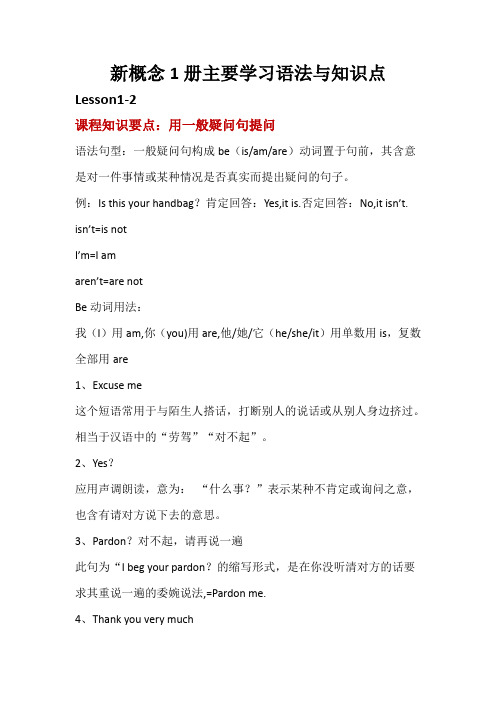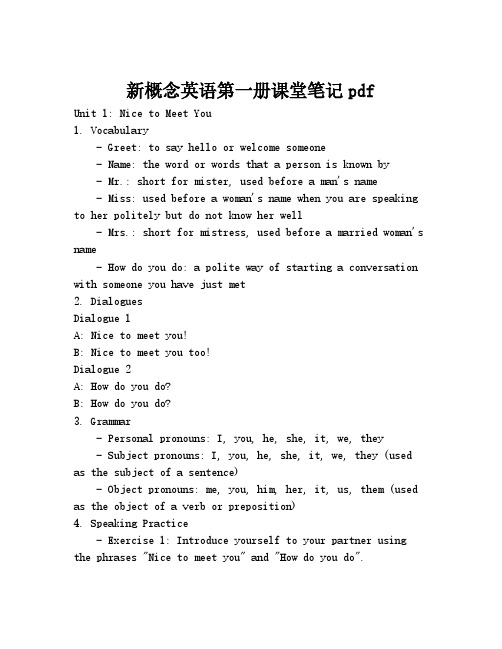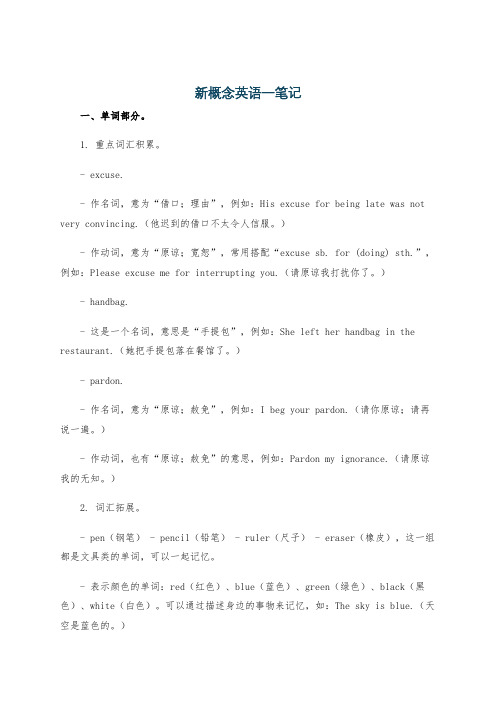新东方新概念1笔记
新概念 一册学习笔记

新概念一册学习笔记第一课:英语语法基础1. 名词(Noun)- 物质名词:指表示人、动物、事物的名称,如 dog、apple - 抽象名词:指表示抽象概念的名称,如 love、happiness - 集体名词:指表示一类人或物的名称,如 family、team2. 代词(Pronoun)- 主格代词:用于代替主语,如 I、he、she- 宾格代词:用于代替宾语,如 me、him、her- 物主代词:用于表示所有关系,如 my、his、her3. 冠词(Article)- 定冠词:用于指特定的人或物,如 the- 不定冠词:用于泛指一类人或物,如 a、an4. 形容词(Adjective)- 用于修饰名词,描述事物的性质或特点,如 beautiful、happy5. 副词(Adverb)- 用于修饰动词、形容词或其他副词,表示时间、地点、程度等,如 slowly、here、very6. 动词(Verb)- 表示动作、状态或存在的词,如 eat、run、be7. 介词(Preposition)- 用于表示关系、方位、方法等,如 in、on、at8. 连词(Conjunction)- 用于连接句子或词组,如 and、but、because9. 感叹词(Interjection)- 用于表示强烈的感情或称赞等,如 oh、wow、good以上是英语语法基础的一些要点,希望对你的研究有所帮助!第二课:研究方法技巧1. 多听多说多读多写- 通过听英语原声、进行口语练、阅读英文文章、写作英文作文等方式,增强听说读写能力。
2. 创造英语环境- 尽量让自己沉浸在英语环境中,如观看英语电影、听英语歌曲、参加英语角等。
3. 记忆单词和短语- 经常复和记忆常用的单词和短语,可以使用单词卡片、手机应用等工具。
4. 制定研究计划- 设定研究目标,合理安排研究时间,每天坚持研究一些英语内容。
这些学习方法技巧可以帮助你更好地学习英语,提高语言能力。
(完整版)新概念英语第一册笔记完整版

(完整版)新概念英语第一册笔记完整版新概念英语第一册笔记完整版1)v. 原谅eg. Excuse me. 请原谅,劳驾。
2)n. 借口eg.It?s an excuse.me pron. 我(宾格:用来做宾语的。
)eg. He loves me.他爱我.eg. She cheats me.他骗我.eg. Please tell me.他告诉我.Excuse me 的用法这个短语经常被译作―对不起‖,但它并不表示你有什么过错,而是说你要打搅别人,所以常被译作―劳驾‖。
1)为了要引起别人的注意eg. Excuse me. Is this you handbag?2)要打扰某人或要打断别人话eg. Excuse me . May I ask you a question?3) 向陌生人问路eg. Excuse me. Could you please tell me the way to the railway station?4) 向某人借东西eg. Excuse me. Can I borrow your pen?5) 需要从别人身边挤过或让别人给自己让路eg. Excuse me. Could you please make some room for me?6) 要求在宴席或会议中途中离开一会儿eg. Excuse me. May I lease for a little while?sorry 用于当你做错事而向别人道歉的时候,表示―对不起‖。
1)请问几点了?eg. Excuse me. What time is it?2) 不小心把水弄到了别人的身上。
eg. Sorry. 或者I?m sorry!3) 对不起,我先失陪一下eg. Excuse me.4) 误解了别人的意思?eg. Sorry. ?yes1) adv. 是的(对一般疑问句的肯定回答)eg. Are you mad? --Yes, I am.2)经常用于应答,表示―什么事‖。
新概念英语1课堂笔记

新概念英语1课堂笔记一、单词部分。
1. be动词(am/is/are)- 用法:- am用于第一人称单数I,例如:I am a student.(我是一名学生。
)- is用于第三人称单数(he/she/it和单数名词),如:He is a doctor.(他是一名医生。
),The cat is cute.(这只猫很可爱。
)- are用于第二人称you(单复数同形)以及复数名词和代词,例如:You are my friends.(你们是我的朋友。
),They are teachers.(他们是老师。
)2. 名词(noun)- 可数名词:- 有单复数形式,复数形式的构成规则:- 一般情况加 -s,如book - books,pen - pens。
- 以s, x, ch, sh结尾的加 -es,如bus - buses,box - boxes,watch - watches,brush - brushes。
- 以辅音字母 + y结尾的,把y变为i再加 -es,如baby - babies,city - cities。
- 以f或fe结尾的,把f或fe变为v再加 -es,如knife - knives,wife - wives(但也有一些特殊情况,如roof - roofs)。
- 不可数名词:- 没有复数形式,例如water(水),milk(牛奶),bread(面包)等。
在表示数量时,要用相应的量词词组,如a glass of water(一杯水),a piece of bread (一片面包)。
3. 形容词(adjective)- 用法:用来修饰名词,说明事物或人的特征。
例如:a beautiful flower(一朵美丽的花朵),a tall boy(一个高个子男孩)。
- 形容词的位置:一般放在名词前面,但在某些结构中也可以后置,如something interesting(一些有趣的东西)。
4. 代词(pronoun)- 人称代词:- 主格:I(我),you(你/你们),he(他),she(她),it(它),we(我们),they(他们/她们/它们)。
新概念第一册详细笔记

新概念第一册详细笔记学英语这事儿,对我来说就像一场漫长的冒险。
新概念第一册,那可是我这场冒险中的重要一站。
还记得最初接触新概念第一册的时候,我满心好奇又带着点小紧张。
打开那本书,就好像打开了一个神秘的宝盒,里面藏着无数的知识宝藏等待我去发掘。
先来说说那些单词吧。
新概念第一册里的单词,那可真是五花八门。
从日常用品到各种动作,从简单的数字到复杂的情感,应有尽有。
就比如说“apple”这个单词,看着简单,可刚开始记的时候,我老是读不准。
我就一遍一遍地读,“apple,apple,苹果,苹果”,读得我自己都觉得好笑。
有时候晚上睡觉前还在嘴里念叨,把我妈都给逗乐了,说我做梦都在念单词。
再讲讲那些课文。
课文里的场景简直太生动了,就好像一幅幅画摆在我面前。
有一篇是讲在商店买东西的,那对话详细得呀,让我感觉自己都置身于那个小小的商店里。
“Can I help you?” “Yes, I want a pen.” 我仿佛能看到售货员热情的笑容和顾客认真挑选的样子。
为了把这些课文背下来,我可是费了不少劲儿。
早上起来背,晚上睡前背,就连上厕所的那点时间都不放过。
有一次,我正蹲在厕所里背课文,背得太投入,居然在厕所里待了好久,我妈在外面敲门问我是不是掉进去了,现在想起来都觉得有点不好意思。
语法部分更是让我又爱又恨。
那些时态、句型,一开始就像一团乱麻。
什么一般现在时、现在进行时,把我搞得晕头转向。
记得有一次学现在进行时,老师讲“be + doing”这个结构,我怎么都理解不了。
回家后我就一直琢磨,一边在本子上写例句,一边自言自语:“I'm reading a book. He's playing football.” 写着写着,突然就好像开窍了一样,那种感觉,就像是在黑暗中走了好久,终于看到了亮光,别提多开心了。
做课后练习题的时候也挺有意思。
有时候一道题要想好久,抓耳挠腮的。
做错了就赶紧改,还在旁边写上错误的原因,提醒自己下次别再犯错。
新概念英语一册笔记

新概念1册主要学习语法与知识点Lesson1-2课程知识要点:用一般疑问句提问语法句型:一般疑问句构成be(is/am/are)动词置于句前,其含意是对一件事情或某种情况是否真实而提出疑问的句子。
例:Is this your handbag?肯定回答:Yes,it is.否定回答:No,it isn’t. isn’t=is notI’m=I amaren’t=are notBe动词用法:我(I)用am,你(you)用are,他/她/它(he/she/it)用单数用is,复数全部用are1、Excuse me这个短语常用于与陌生人搭话,打断别人的说话或从别人身边挤过。
相当于汉语中的“劳驾”“对不起”。
2、Yes?应用声调朗读,意为:“什么事?”表示某种不肯定或询问之意,也含有请对方说下去的意思。
3、Pardon?对不起,请再说一遍此句为“I beg your pardon?的缩写形式,是在你没听清对方的话要求其重说一遍的委婉说法,=Pardon me.4、Thank you very much非常感谢!当别人帮助了你,你表示感谢即用此句。
=Thanks/Thank you/Tanks a lot.5、数字1~10的英文写法1—one 2—two 3—three 4—four 5—five 6—six 7—seven 8—eight 9—nine 10—tenLesson3-4课文概述要点:祈使句1、My coat and my umbrella please.请把我的大衣和伞拿给我。
这是一个省略形式的祈使句,完整的句子应为:Give me my coat and my umbrella, please.Please可放句首也可放句尾。
口语中,在语境明确的情况下通常可省略动词和间接宾语,如: (Show me your) Ticket, please.请出示你的票。
(Show me your)Passport, please.请出示您的护照。
新概念英语第一册课堂笔记pdf

新概念英语第一册课堂笔记pdfUnit 1: Nice to Meet You1. Vocabulary- Greet: to say hello or welcome someone- Name: the word or words that a person is known by- Mr.: short for mister, used before a man's name- Miss: used before a woman's name when you are speaking to her politely but do not know her well- Mrs.: short for mistress, used before a married woman's name- How do you do: a polite way of starting a conversation with someone you have just met2. DialoguesDialogue 1A: Nice to meet you!B: Nice to meet you too!Dialogue 2A: How do you do?B: How do you do?3. Grammar- Personal pronouns: I, you, he, she, it, we, they- Subject pronouns: I, you, he, she, it, we, they (used as the subject of a sentence)- Object pronouns: me, you, him, her, it, us, them (used as the object of a verb or preposition)4. Speaking Practice- Exercise 1: Introduce yourself to your partner using the phrases "Nice to meet you" and "How do you do".- Exercise 2: Practice using the subject pronouns in sentences.Unit 2: What's Your Name?1. Vocabulary- Name: the word or words that a person is known by- Surname: the name that you share with other members of your family; last name- Christian name: the name given to you when you were baptized, especially if you are a Christian- First name: the name that you have from birth, that comes before your family name- Middle name: a name that is between your first name and your family name- Full name: your first name, any middle names, and your family name- Initials: the first letters of each of your names, used as a short way of writing your full name2. DialoguesDialogue 1A: What's your name?B: My name is John Smith.Dialogue 2A: What's your full name?B: My full name is Mary Jane Johnson.3. Grammar- Interrogative pronouns: what, which, who, whom, whose - Wh-questions: questions that begin with "wh-" words and expect information as an answer4. Speaking Practice- Exercise 1: Ask your partner for their full name using the question "What's your full name?"- Exercise 2: Practice asking and answering questions with different interrogative pronouns.Unit 3: Where are You From?1. Vocabulary- Nationality: the legal relationship between a person and a country- Country: an area of land that has its own government, army, etc- City: a large and important town- Town: a place where people live and work, that is smaller than a city- Village: the smallest type of town where people live in the countryside- Capital: the most important city in a country, where the government is based2. DialoguesDialogue 1A: Where are you from?B: I'm from China.Dialogue 2A: What's your nationality?B: I'm French.3. Grammar- Verb to be: am, is, are- Present simple: the form of a verb used to describe actions that regularly happen or facts that are always true 4. Speaking Practice- Exercise 1: Ask your partner where they are from using the question "Where are you from?"- Exercise 2: Practice using the verb "to be" in sentences about nationality and origin.(Note: The content above is a sample and does not fully cover the entire document "新概念英语第一册课堂笔记pdf".)。
新概念英语一笔记

新概念英语一笔记一、单词部分。
1. 重点词汇积累。
- excuse.- 作名词,意为“借口;理由”,例如:His excuse for being late was not very convincing.(他迟到的借口不太令人信服。
)- 作动词,意为“原谅;宽恕”,常用搭配“excuse sb. for (doing) sth.”,例如:Please excuse me for interrupting you.(请原谅我打扰你了。
)- handbag.- 这是一个名词,意思是“手提包”,例如:She left her handbag in the restaurant.(她把手提包落在餐馆了。
)- pardon.- 作名词,意为“原谅;赦免”,例如:I beg your pardon.(请你原谅;请再说一遍。
)- 作动词,也有“原谅;赦免”的意思,例如:Pardon my ignorance.(请原谅我的无知。
)2. 词汇拓展。
- pen(钢笔) - pencil(铅笔) - ruler(尺子) - eraser(橡皮),这一组都是文具类的单词,可以一起记忆。
- 表示颜色的单词:red(红色)、blue(蓝色)、green(绿色)、black(黑色)、white(白色)。
可以通过描述身边的事物来记忆,如:The sky is blue.(天空是蓝色的。
)二、语法部分。
1. 一般现在时。
- 概念:表示经常发生的动作或存在的状态。
- 结构:- 主语为第三人称单数(he/she/it等)时,动词要加 -s或 -es。
例如:He likes reading books.(他喜欢读书。
)- 主语为第一人称(I)、第二人称(you)和复数(they/we等)时,动词用原形。
例如:I play football every Sunday.(我每个星期天踢足球。
)- 时间状语:often(经常)、usually(通常)、sometimes(有时候)、every day(每天)等。
新概念一册笔记

新概念一册笔记新概念一册,就像一把神奇的钥匙,能为我们打开英语世界的大门。
咱们先说单词,那一个个单词就像是一颗颗珍珠,得好好攒着。
记单词的时候,可不能死记硬背,得像交朋友一样,多了解了解它们的脾气秉性。
比如说“apple”,你就想想那红红甜甜的大苹果,是不是一下子就记住啦?还有“banana”,弯弯的像月牙儿,多形象啊!你要是光盯着字母看,那可就太枯燥啦,这单词能跟你闹别扭,就是不让你记住。
再说说语法,这语法就像盖房子的框架,没它可不行。
什么一般现在时、现在进行时,是不是听着就头疼?别慌!咱们慢慢来。
就拿一般现在时来说,那就是经常发生的事儿,像太阳每天升起,你每天吃饭睡觉,这不都是一般现在时嘛。
现在进行时呢,就是正在发生的事儿,比如“我正在写作业”,是不是一下子就明白啦?可别把这些语法当成大老虎,它们其实就是纸老虎,只要你用心,就能把它们拿下。
课文也很重要啊!课文就像是一部部精彩的小电影。
读课文的时候,你得把自己当成主角,融入进去。
想象一下你在和外国朋友聊天,那感觉多棒!而且读课文还能帮你练发音,发音准了,说英语就更有自信啦。
要是读得磕磕绊绊,那不就像唱歌跑调一样尴尬嘛?还有那些练习题,可别小看它们。
它们就像是一个个小关卡,等着你去挑战。
做错了也别怕,这正好能让你知道自己哪里薄弱,赶紧补上。
要是全做对了,那不得给自己点个赞,这说明你学得不错呀!记笔记也有讲究,不能乱涂乱画。
要把重点、难点标清楚,就像给宝贝分类一样。
字也得写工整,不然回头自己都看不懂,那不白记啦?总之,学新概念一册就得用心、用情,把它当成你的好朋友。
只要你坚持下去,还怕英语学不好?相信自己,加油!。
- 1、下载文档前请自行甄别文档内容的完整性,平台不提供额外的编辑、内容补充、找答案等附加服务。
- 2、"仅部分预览"的文档,不可在线预览部分如存在完整性等问题,可反馈申请退款(可完整预览的文档不适用该条件!)。
- 3、如文档侵犯您的权益,请联系客服反馈,我们会尽快为您处理(人工客服工作时间:9:00-18:30)。
名词性的物主代词是单独使用的This is my pen. 这是我的钢笔。
This pen is mine. 这只笔是我的。
yes读降调表示对某件事情的认同,读升调表示询问v. verb 动词adj. adjective 形容词adv. adverb 副词pron. pronoun 代词prep. preposition 介词n. noun 名词conj. conjunction 连词Lesson.3here 是地点副词there 那儿home 家abroad 国外downstairs 楼底下upstairs 楼上downtown 市中心这些地点副词的前面不能加介词时间副词和地点副词前不能加介词male男性;female女性ladies and gentlemen女士们先生们sir对男性一种比拟有礼貌的称呼或学生对男性老师的一种称呼或下级对上级的称呼Lady first女士优先Miss既不愿意被称为已婚的也不愿意被称为未婚的。
Laugh,and the world laughs with you;Weep,and you weep alone当你笑的时候,世界与你同笑,当你哭的时候,你只有单独哭泣。
Lose one’s shirt丧失某人的财产Keep one’s shirt on耐着性子不发火Eat like a bird吃得少A small/big potato小/大人物情景表达How time flies! Ihave to be going now!I must go off/be off/ be leaving.I suppose I’d better goI’m really enjoying meeting youIt’s a pleasure to be with you here,but……I can’t believe that time has come to say goodbye to youThank you for all you’ve done for meLet’s keep in touch./Don’t forget to drop me a line.All the best to you./Remember me to your……We must get together again soon.Lesson.53个冠词a, an 是不定冠词用于:1、可数名字单数前面必须用不定冠词2、具有不确定意义的事或名词前面This is a watcha 用在普通名词前面,an 用于元音音素〔元音发音的单词〕前面a pen an apple an umbrella an egg an hour a universitythe 是定冠词,表示特指Look, look, a man is coming into the classroom.The man is my teacher.专有特指名词用theThe Great Wall选择疑问句:在两者或者三者中进行选择特殊疑问词or选择疑问句语调前升后降Are you a teacher or a student?I am a teacher.and 用在句首表示转折too 一般用于肯定句中either 也Lesson.7Shared joy is a double joy;shared is half a sorrow.Life is what happens to us while we are making other plans.生活就是经常发生的一些偶然。
副词:时间副词、地点副词、方式副词、程度副词、频率副词。
时间副词、地点副词前不可以加介词。
特殊疑问句=特殊疑问词+一般疑问句Lesson.9What you get is a living.[获得是一种生存/生活方式]What you give is a life.[给予是一种生命价值。
]Today is the first day of the rest of your life.Tomorrow is another day.今天是你余生的第一天。
How about you?你怎么样?How about that?怎么会这样?那一个怎么样How come?=why?为什么?How goes it?事情进展如何?How is it going? 事情进展如何?look see watchlook 强调动作:look at sth;look into my eyes;look out of the window see 强调结果see you later. See you tomorrowwatch 观看移动的一些东西makeLesson.11whose:谁的对形容性物主代词提问This is my pen.This is whose pen.Is this whose pen?Whose pen is this.对名词性物主代词提问。
This pen is mine.This pen is whose.Is this pen whose?Whose is this pen?经典口语Be on one’s high horse趾高气昂Fight tooth and nail奋力作战While lie善意的谎话Eye for eye以牙还牙Cup of tea最喜欢的东西Face the music面对现实,勇于承当后果Out of sight out of mind眼不见心不烦No pains no gains不劳无获The outsider sees the most of the game旁观者清。
Lesson.13Never do today what you can put off until tomorrow.不要把你今天能做的拖到明天。
Come on.过来;得了吧,拜托Go 加油friend 朋友〔正式〕pal 好友,伙伴〔随意〕buddy 伙伴,朋友〔随意〕Lesson.15better to light a candle than to curse the darkness与其去诅咒黑夜,还不如去点亮一支蜡烛。
All happy families are alike; each unhappy family is unhappy in its own way.所有幸福的家庭都是相似的,每个不幸的家庭都有各自的辛酸。
Life is like a fable. It is not measured by its length, but by its content.生活象一那么寓言。
它并不是由它的长短来衡量,而是由它的内容来衡量。
Eat to live, but do not live to eat.吃饭是为了生活,但生活并不仅仅为了吃饭。
Trouble is part of your life. If you don’t share it, you don’t give the person who loves you a chance to love you enough.麻烦是你人生发一局部,如果你不去分享它,就等于是没有给深爱你的人一次彻底爱你的时机。
Lesson.17hard-working / hard-work / work hardhard-working adj. 勤奋的hard-work 艰苦的工作This is a hard-work.work hard 努力地工作There be 句型:there be 结构表示某处有某物。
There is +可数/不可数There are +不可数名词常见的方位介词:in,into,on,over,under,near,between,beside,across,out of,to,through等走过平路或者草坪,街道用across,穿过桥或者有坡度的道路用over介词的用法:1.跟在be动词之后2.跟在一些不及物动词之后。
Lesson.21Life is not a problem to be solved, but a reality to be experienced.生活不是一个需要解决的问题,而是一种需要经历的现实。
Always find a question for yourself whether you are happy or not.Keep your fears to yourself, but share your courage with others.把你的恐惧留给自己,与别人一起分享你的勇气。
some 一些anysome 和any 跟可数名词的复数或者是不可数名词some bookssome milk一般情况下,someWould you like something to drink? 你想喝点什么吗?any 用于否认句和疑问句Lesson.23Where there is a will, there is a way.有志者,事竟成。
will 意志Most people are so busy making a living that they forget to make a life.大多数人忙于求生,而忘了真正的生活。
big 不仅指物理量的大小,还指精神方面的大小This is a big box.Dengxiaoping is a big man.邓小平是个大人物。
large 更多指物理量的大小。
There is a large woman.large manlittle 指物理量的小,暗含一种喜爱的意思Look, that little girl.small 单指物理上的小small person 卑劣小人Lesson.27I wish that you have had a very good starting point of the new week.There are three things men can do with women, love them, suffer for them and turn them into literature.世界上的男人能够为女人做三件事情,爱她们,为她们受苦,把她们变成文学。
literature 文学When a beautiful woman smiles, somebody's purse weeps.当一个漂亮女人微笑时,某人的钱包就会流泪。
weep 流泪Lesson.29情态动词mustcanmayneed1 情态动词表示人们情感、状态或情绪变化的一种助动词,它本身是具有实际意义的。
